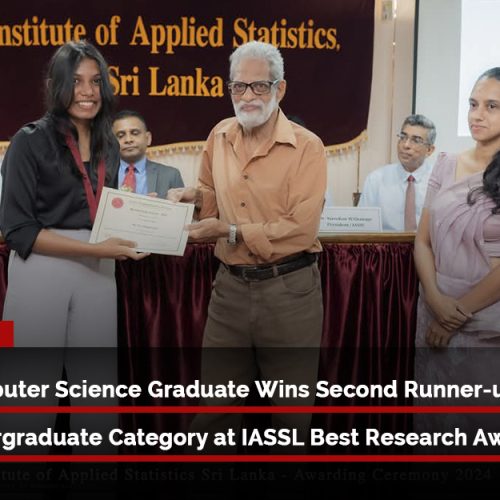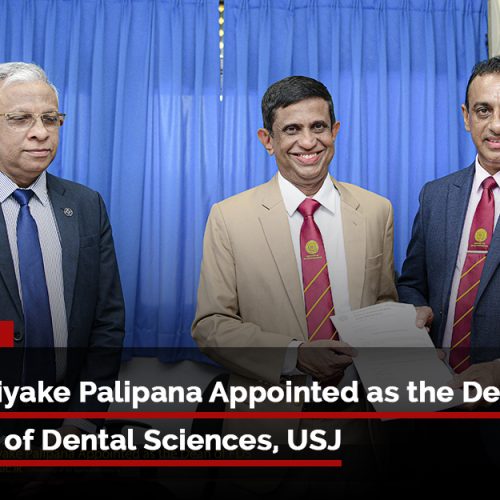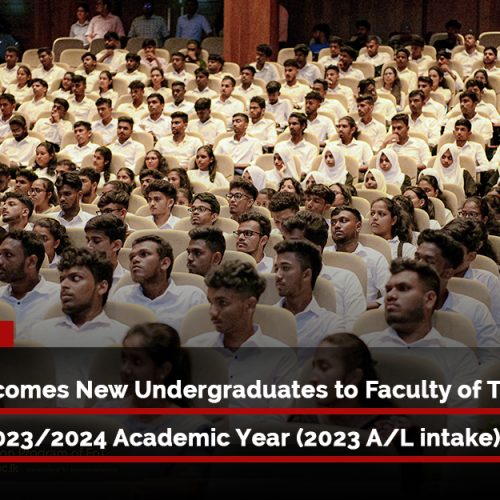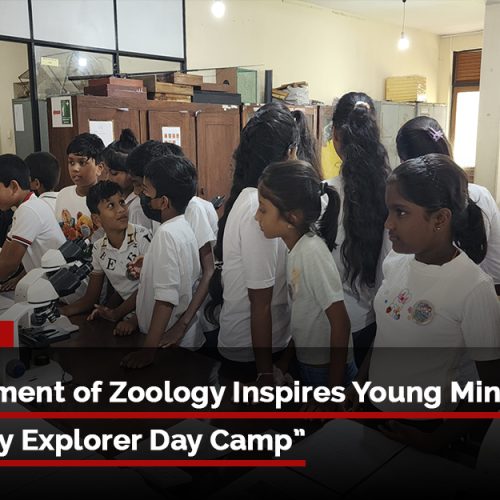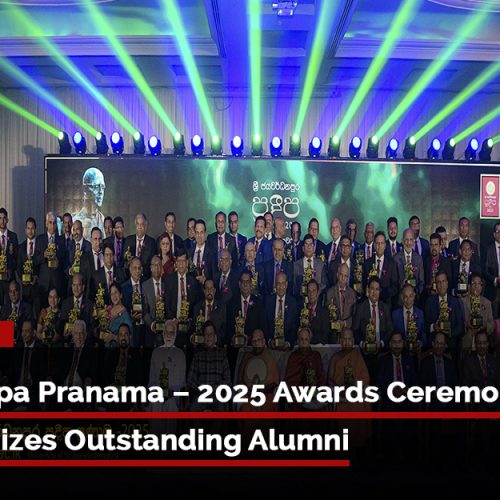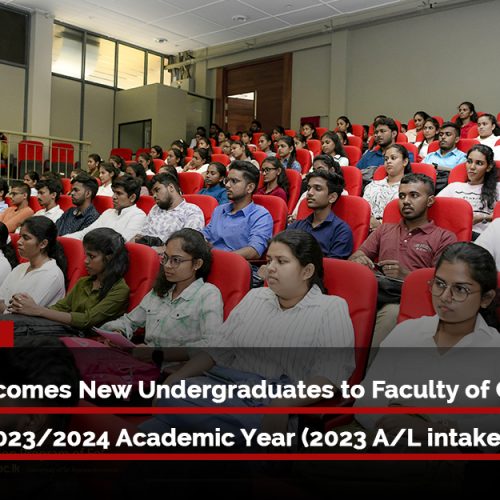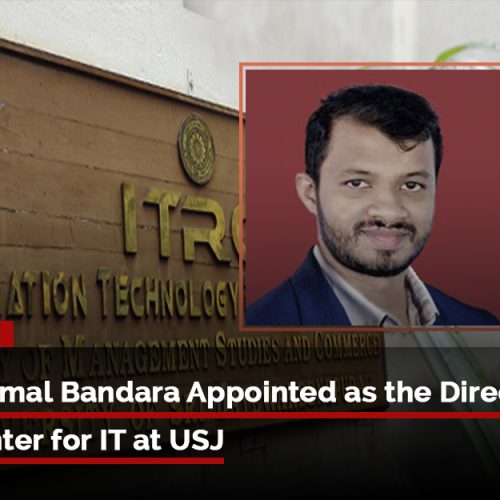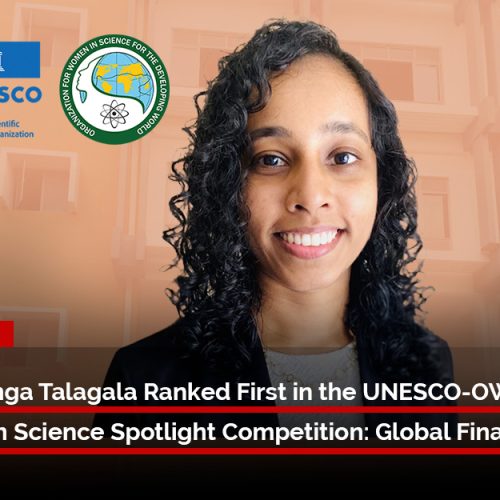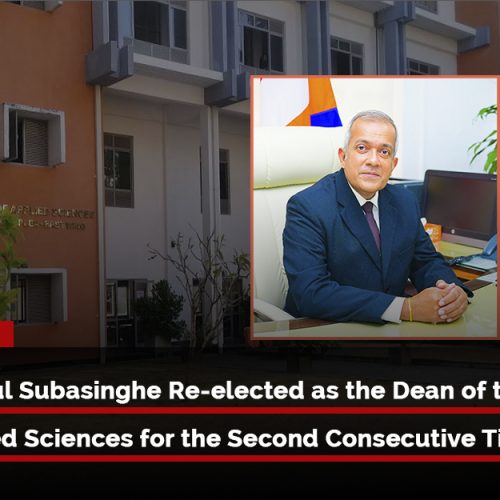Convocation Address delivered by Professor M. M. Karunanayake, Emeritus Professor, University of Sri Jayewardenepura at the 38th Convocation of the University was held on 5 – 7 February 2012 at Bandaranaike Memorial International Conference Hall.
I consider it a privilege to have been invited by the Vice Chancellor, Dean and Members of the Faculty of Humanities and Social Sciences, and the University Senate to deliver the convocation address at this session of the 38th Convocation. As a university event, the convocation is important not only because it is an annual event to confer degrees but also because it makes us reaffirm our faith in the values and ideals of a university. I have, of course, special affinity to your Faculty (known until recently as the Faculty of Arts) for the reason that in a university career spanning forty-one years, I had served it not only as a Faculty member but also as the Chair and Head of the Department of Geography and the Dean of the Faculty. I congratulate each one of you on being conferred your bachelor’s degree today. I am sure your sense of accomplishment is all the more because you are the first batch of graduates to pass out of the Faculty of Humanities and Social Sciences, after its transformation to the present status early last year.
In my address I thought of sharing with you some thoughts on the subject “Developmental Role of Universities” because it is of both topical and societal importance. While much has been achieved by the universities in Sri Lanka in terms of producing the country’s intelligentsia, yet it appears, they have fallen short of playing a truly developmental role.
What is a Developmental Role?
I would like to define at the outset what is meant by a developmental role. Given the complexities of a globalized world, the concept of the ‘classical university’ has been under pressure in the Western world for quite some time. For the same reason the need to re-examine the role of the university is all the more pressing in the developing world. To be developmental, a university has to generate knowledge for a national purpose to bring about developmental outcomes. This requires affirmative action on the part of universities.
Therefore, a developmental role for the universities implies an expansion of its horizons and networking with a host of institutions, agencies and stakeholders. The crux of the matter is that an affirmatively development oriented university needs to be supported by external agencies and stakeholders in implementing its ideas and strategies. In the words of Judith Sutz (2006):
To increase their contribution to development through the production and distribution of knowledge, universities in developing countries need to transform themselves into ‘developmental universities’. But to achieve this, other participants, such as industry and government, must also be prepared to take on new responsibilities. No ready-made model exists to guide these changes; they will require both creativity and the willingness to engage in thoughtful dialogue, both within and outside universities.
In my view a developmental university should contribute to development not merely by the production and distribution of ‘developmental knowledge’ (meaning knowledge with a development focus) but also by establishing a link to development practice.
The transition to a developmental university need not necessarily imply that the ideals of the classical university have to be totally set aside. On the contrary, the traditions of the classical university- intellectual freedom and tolerance, critical inquiry and analysis, and humanism-should take on new relevance and meaning in a developmental university.
Why a Developmental Role?
Over a period of time the universities in Sri Lanka have been transforming themselves in response to both internal and external stimuli-some of which have been precipitated by global change. But such stimuli are becoming increasingly complex. What does change mean in the present context? On one hand, change in universities has to be rapid and on the other, it has to be qualitatively different.
A university being supported by public funds has to live up to the expectations of society and be socially responsible. Hence the universities have to contribute pro-actively to the country’s development. It is by positioning themselves in a developmental role that the universities could effectively address this task.
Universities the world over are seeking ways and means of dealing with new demands and responsibilities. This is evident not only in the developed countries but also in the developing countries. For example, in many African countries, Ghana and Nigeria are examples; the task of ‘decolonizing’ the universities is going ahead apace. This implies a commitment to break away from a model of development thinking which is essentially euro-centric and to rely on more integrated models that draw inspiration from indigenous cultural roots as well. In developmental universities knowledge cannot be imitative but creative. It is, therefore, necessary to think outside conventional knowledge frameworks.
There was a time when the term higher education was synonymous with university education. This is no longer so. In Sri Lanka, it has been government policy to set up degree awarding institutes in specific disciplinary areas to meet the needs of a knowledge society. The National Institute of Business Management (NIBM), Sri Lanka Institute of Development Administration (SLIDA), National Institute of Education (NIE) and Sri Lanka Institute of Information Technology (SLIIT) are examples. There are also a large number of private institutes affiliated to foreign universities. There will be further diversification of the higher education field with the establishment of private universities. It is therefore vital for the state university system to reassess its role in national development to maintain its primacy in the field of higher education. Taking up a developmental role is an imperative in this regard. What are the developmental challenges facing Sri Lanka that should be of concern to a developmental university? Let me outline a few that are of concern to me as a geographer and social scientist.
Urbanization is taking place rapidly and transforms both the urban and the rural landscape. But often in the development process the connectivity between the urban and the rural has been forgotten. Regional disparities in growth are still in evidence and this is more so in relation to the war devastated North and the East. While much development work is on-going in the peripheral regions, it is not embedded in regional science.
Poverty continues to assail a large segment of the Sri Lankan population although poverty rates have declined in recent years. However, greater impact has been made in reducing ‘human poverty’ than ‘income poverty’. What accounts for this situation? In my view there is a significant gap in poverty alleviation strategies that has escaped the attention of policy makers. Thus, well designed coping strategies to deal with seasonal poverty are not in place. Not much attention has been paid to the poverty of women or children nor the means to address it. Strategies for income generation have often depended on low-skill jobs that do not require the use of tools or the need to use brainpower. The means of dealing with the derived ‘poverty syndrome’ (an outcome of unexpected exigencies, for example, drought, floods, and pestilence) has not been keyed into policy other than through public assistance programmes.
Sri Lanka is also faced with the problem of environmental degradation. The sustainable use of natural resources has become an issue of primary importance. This is more so because the Sri Lankan population is mostly rural, and hence, dependent on a biomass economy. The vulnerabilities of the rural population are further exacerbated by natural calamities. The urban scene in Sri Lanka is no less different with problems such as urban congestion, pollution, substandard living conditions etc. showing up prominently. Although there is now more environmental awareness in the country than was the case a few decades back, mainly as a result of the establishment of dedicated institutions such as the Central Environment Authority and departments and ministries responsible for environmental management, yet there is much that needs the attention of universities and the government. Without joint commitment of universities and the government it would not be possible to prevent the ‘ecological foot print’ (a measure of human demand on the Earth’s ecosystems) as it relates to our country getting bigger. One important aspect relating to environmental issues is that university research has almost totally ignored the eco-political economy of resource use and its environmental outcomes.
The issue of internal displacement that was an outcome of the thirty year war has been a humanitarian disaster of large proportions. Through governmental efforts as well as the efforts of international agencies the resettlement process has now almost been completed. It is noted that there was no role for the universities in the process. However, resettlement has to be followed up by social reconstruction and it is up to university research teams to explore the possibilities of getting involved in the reconstruction exercise by interacting with government ministries and other agencies. The universities could provide many research and advisory inputs that would be of relevance in the social reconstruction process, particularly in the areas of health and sanitation, livelihood generation, community integration, and human welfare.
Another area that should be of concern to a developmental university is the geopolitics of the Indian Ocean region with particular reference to peninsular India and Sri Lanka. For example, the volatility of Tamilnadu politics and its repercussions on Sri Lanka have not been well researched from a geopolitical perspective. Furthermore, despite the demarcation of the Exclusive Economic Zone, there is still potential for conflict between India and Sri Lanka in regard to resource exploitation (fisheries, oil exploration, ocean bed exploration etc.), maritime navigation, and marine environmental conservation. The limits of the extended economic zone still await adjudication. What are the geopolitical implications in this regard? These issues have to be researched by our universities for their policy and strategic implications.
But does this mean that so far, the Sri Lankan universities have not taken serious note of these issues? Many of these issues have been of concern to university academics and researchers over the past many years, but mostly in a theoretical and an academic way. Furthermore, these issues have not been institutionalized concerns within the university system. Some issues have either been overlooked or bypassed because university academics have been reluctant to step out of their ‘comfort zone’. It has not been the norm among academics to translate theory into practice by engaging with the industry and the government. While some links have been forged these have been of limited scope and of a personal nature. At the same time governmental and other agencies have not been too keen to mainstream university research into policy, except when it is the outcome of commissioned research. Clearly this is an impasse that has to be overcome if our universities are to transform themselves into developmental universities geared to nation building.
Towards Developmental Universities
How do we elevate Sri Lankan universities to the rank of developmental universities? An essential requirement is that they have to be research oriented. At present universities in Sri Lanka are at best teaching universities. We find that in world university ranking systems such as the Times Higher Education (THE) Rankings and the Academic Ranking of World Universities (ARWU) high priority is accorded to research in assessing the worth of universities. In making universities research oriented it is important to opt for developmental research with an applied focus, but not to the exclusion of theory oriented research.
An important corollary is that university departments should formulate development oriented research agendas to address issues of national importance. It is imperative that a mechanism be developed to convey the outcomes of research to policy makers. It is also necessary that research is not confined to discipline based research. Multidisciplinary, interdisciplinary and trans-disciplinary research should run parallel to disciplinary research. University research has to be the outcome of intensive interaction that takes place within knowledge clusters that brings together experts from different disciplines in a collective research enterprise. As Anthony D. Cortese of the Massachusetts Institute of Technology Panel on Alliance for Global Sustainability has pointed out “learning (read as research) must have the same lateral rigour as it does vertical rigour”. Through appropriate funding and other incentives universities have to attract full time research students. The presence of foreign research scholars and students should be encouraged as a means of promoting interactive research across international boundaries.
Communication of research findings through refereed journals both local and international; research monographs, books or contributions to chapters in books published either locally or internationally, should be the hall mark of a developmental university. One of the prime responsibilities of a development university should be to publish disciplinary or multi disciplinary journals on a regular basis. The inability to do so remains a significant drawback at present. It is the responsibility of universities to facilitate this process. It may be noted that international journals are indexed based on high quality of subject matter, wide availability, and regularity of publication. However, there could also be less exacting means of communicating research information. A very convenient way would be to publish research bulletins that provide information on completed and on-going research projects in abstract form including those relating to research degrees, either bi-annually or annually.
It is pertinent to note that the University of Sri Jayewardenepura through its recently instituted World Class University Project (WCUP), funded by the Ministry of Higher Education and the UGC, is planning to uplift the research status of the university. The objective is to develop disciplinary as well as multi-disciplinary research at the Ph.D. level. Disciplinary research is to be undertaken in the disciplines falling within the ambit of Humanities, Life Sciences, Management Sciences, Medical Sciences, Physical Sciences, and the Social Sciences. Multi-disciplinary research will be undertaken within a six-fold cluster framework viz. Social harmony and national integrity; Social protection (food security, poverty alleviation, water security etc.); Environmental management; Culture and indigenous knowledge; Health care and delivery; and Management and entrepreneurship. It is project policy to enrol research students on a full time basis for which funds are made available by the WCUP. The supervisors and co-supervisors will be directly involved with the research students in implementing the research programme. Another innovative feature of the project is to have ‘reading groups’ to comment on research outputs at the draft stages of research papers or theses. A primary purpose of the WCUP is to develop an interactive research culture within the university through the medium of seminars, workshops and conferences. Moreover, the supervisors and research students will be encouraged to jointly publish the outcome of on-going research and communicate them to policy makers. The Vice Chancellor, Dr. N.L.A. Karunaratne has to be given credit for the initial design and formulation of the WCUP at the University of Sri Jayewardenepura.
While we aspire to build research universities this should not be at the expense of teaching. This is particularly so because learning opportunities available to the Sri Lankan undergraduate are far more restricted than those available to the undergraduate in the developed world. University teaching matters not only to students but also to the teachers. One cannot agree more with Tara Brabazon (2010) when she says: It is a privilege to be a university academic. It is a gift that I appreciate each day. It is a joy to teach the best and brightest of each generation to become their best selves. Academics must always research and write so that we are working at the edge of knowledge, but it is our responsibility to share this new knowledge with the next generation. Teaching students is our first moment and opportunity for dissemination of our research, so that they can build on it in the future.
It is now accepted that there has to be a paradigm shift in university teaching from the conventional knowledge transmission method to an interactive method of knowledge transfer. Moreover, it is necessary, that the students be cultured in scientific literacy. I use the term ‘scientific literacy’ in its broadest sense and in relation to all disciplines including the humanities and social sciences. According to the Organization for Economic Development and Cooperation (OECD) scientifically literate students would demonstrate several characteristics the more conspicuous of which would be: to know and understand the scientific concepts and processes required for participation in society; identify scientific issues underlying national and local decisions; express positions that are scientifically and technologically informed; evaluate the quality of scientific information on the basis of its source and the methods used to generate it; pose and evaluate arguments based on evidence and apply conclusions from such arguments appropriately. It is necessary that the graduates who come out of a developmental university be demonstrative of the characteristics mentioned above.
In regard to teaching content a developmental university should reorient existing curricula to meet the development needs of the country. There has to be greater sensitivity to the needs of, as well as the emerging opportunities in, the Sri Lanka economy. Furthermore, new subject areas will have to be introduced to the curricula which combine theory with practice. Field teaching, field research and field laboratories have to be made essential components of the curricula. In the social sciences and the humanities longitudinal field teaching and research should be made feasible through urban and rural community adoption programmes. The focus has to be on experiential learning.
A developmental university should also opt for more inclusive knowledge systems by integrating modern knowledge with indigenous knowledge. It should be the objective of a developmental university to investigate all aspects of indigenous knowledge from the perspective of view of modern science. This can only be done by university departments setting out on a path of exploration to discover, document, categorize and scientifically analyse indigenous knowledge. At present this remains almost an untouched field although tentative beginnings have been made in some universities. However, what is important is not so much to concentrate on the esoteric aspects of indigenous knowledge, but on its essence pertaining to science, health, culture, ethnology, medicine etc. and in-put it into the modern knowledge building project to bring about unique developmental outcomes.
The quality assurance of universities has received a great deal of attention since 2000 with the setting up of a Quality Assurance and Accreditation Council (QAAC) under the University Grants Commission. The preparation of self-evaluation reports has become common place in university departments as well as in the universities. So too are the more formal Subject and Institutional Reviews conducted under the QAAC. Needless to say these initiatives have had a developmental impact on the universities. However, if universities are to become developmental there is a need to do more with such reviews by using them as a basis for forward planning, through rigorous assessment of their contents.
A developmental university has to be visibly developmental. One way of ensuring this is for the universities to set up Advisory Units for National Development. Such units could be the link between specialist academics and governmental and other external constituencies including international agencies. The advisory unit could as a matter of priority document expertise available within universities by areas of specialization. An important area that could be of interest to the advisory unit would be to identify policy and development related issues for indepth research and analysis in consultation with concerned government ministries, departments and institutions. Such units could also take up consultancy services for the government and other agencies enabling the universities to attract funds for their own developmental purposes. The idea of universities setting up consultancy units was one of the recommendations of the Presidential Task Force on University Education Reforms convened in 1998. However, a few exceptions apart, it was not followed up by the universities.
An imperative of a developmental university would be a commitment to social responsibility. It is a means of creating a positive image for the university as well as a means of fostering community confidence in the universities. Social responsibility initiatives of the universities should be those that are concerned with creating social value. In my view such initiatives could be built in academic programmes as field modules. It is encouraging to note that social responsibility projects are now taken up for implementation by some Faculties and Departments of the University of Sri Jayewardenepura. However, what is lacking in our universities is a university level commitment. Therefore, a useful idea would be to enunciate a Social Responsibility Statement by each University laying the groundwork for action. Indeed, this is increasingly becoming common practice in the developed world.
As I mentioned at the outset a developmental university has to interact closely with governmental and other agencies in order to create a developmental impact. It is important that the universities liaise with governmental agencies to promote consensus on issues of national importance such as national integration. On such issues, the institutionalized voice of the universities is only rarely heard at present. It is only when universities are developmental and constructively engage with the government and other external agencies in matters of policy, and research is put into practice, that the country can make headway on vital national issues. Therefore, a primary requirement is for the universities to set up formal arrangements for social advocacy on policy related issues bearing on political economy, social policy, science, medicine, technology and culture and open up space for constructive argumentation and dialogue with policy makers and the government.
Concluding Remarks
Let me now conclude. As you leave this university, full of expectations for the future, may I call upon you to be creative leaders with humane values, positive attitudes, and futuristic thinking, who would put to best use the knowledge, core competencies and skills that you have acquired during your stay at this University, for the greater good of our country and our people; and, as you tread life’s pathways, be proud of your legacy as graduates of this university. I wish you success in your future endeavours.
Professor M. M. Karunanayake
Emeritus Professor
University of Sri Jayewardenepura


